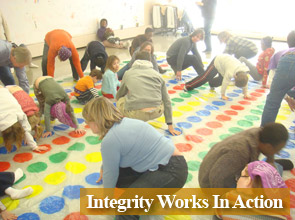
It’s the beginning of my annual “Meatless March,” a month I dedicate to acknowledging the suffering and sacrifice of animals. It’s a month where I face the inherent contradiction between referring to myself as an animal lover and my love for eating them. It’s a month where I try to raise awareness of the need to find ways to minimize the suffering of the living creatures we use to satisfy our appetites. I’m not ready to give up eating meat, and I imagine most people won’t, but I think we would like animals raised and killed as humanely as possible. There are those that believe that from the animal’s point of view, there is no humane wayjust as we humans likely believe there would be no “animanely” way for animals to raise and slaughter us. I can’t argue with them other than to say that some positive change is better than none.
What has this got to do with bullying? Bullying comes from a perception of difference, a misuse of power, and an absence of empathy. People who are bullied (both children and adults) are perceived to be different in some odd or unpopular way. Victims of bullying are vulnerable, and the people who bully them cruelly exercise power. And, it is only possible to bully someone if the bully is able to detach emotionally from the experience of the victim. That’s why empathy training in schools for children has been so successful in preventing bullying. If you feel the feelings of people, you won’t bully them, because if you did, you would feel their pain, fear, and degradation.
Consider the lobster and our ability to eat it after it has been boiled alive. It takes the average lobster 2-3 minutes to die. The only way we can enjoy eating it is by detaching ourselves from its experience. Its difference from us makes it easier for us to do so. We can accentuate the difference by focusing on the oddness of its appearance (based, of course, on the template of us being the perfect standard). It helps to tell ourselves comforting stories about the differences in our respective nervous systems, just as was done in the days of vivisection to justify dissecting live animals such as dogs without anesthetic. We can get away with this terrible cruelty because lobsters are vulnerable and it’s easy to exercise power over them. (Imagine wrestling a person-sized lobster into a boiling pot and you’ll get the picture.)
But what if we didn’t? What if we took a stand against suffering of any kind, by any being, no matter how small, vulnerable, or different? What if we didn’t cloak experience in terms such as “harassment” and “bullying” but went to the heart of it and called it “pain” instead? What if we built a society where every being, no matter how small, no matter how different, had a right to the absence of pain, fear, and degradation? What if we fostered empathy for all the beings that we share the world with, and they didn’t have to justify receiving our mercy by looking or acting like us, or being our friend, or being related, or wagging a tail, or carrying us over jumps, or purring? What if we adults modeled universal empathy to the children we admonish to not bully? I think bullying rates would drop dramatically, don’t you?
So next time you’re at Red Lobster and you’re considering eating that sweet tender meat, ask them if the lobster would be bullied
er
boiled alive. Tell them you will only eat it if it’s killed humanely. Tell them about the “Crustastun”: http://www.telegraph.co.uk/foodanddrink/recipes/4581872/A-humane-way-to-cook-lobster.html and insist they buy and use it if they want your lobster-eating business. Do your part to end bullying; one lobster at a time.












